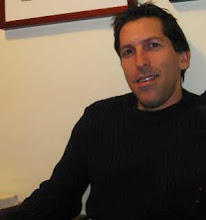I have just completed the second week of classes here.
In a presentation I proposed that I may wish to have my thesis project, or one of my projects while here, be to create a plan for an Interactive Art Department.
 |
| The Ouroboros represents self-reflexivity or cycles |
In other words, is the artist best thought of as a mutant?
In planning a department, I'd be able to create a path for what I feel interactive art can be (right now it feels mostly like science experiments).
In society, and certainly in the world of art, there is a tension between "doing things the accepted way" vs. "risking innovation"
In Darwinian natural natural selection, such risks are undertaken mindlessly and the rewards, while they may come with an experience of pleasure, are that you pass on your DNA. Thus that behavior or trait is selected. In my case, the choice of a thesis - and what to study - seems to be my own free will and thus the risks and rewards can weigh heavily.
If it is free will, does it still make sense to ask, why is this appealing? Something, or No-thing, put the idea in my head - but where did it come from? Why did I think this would be a good idea? Why am I drawn to this idea of having my project in Interactive Art School be to design an Interactive Art School?
I ahve three theories, one I like to play about with the "snake eating it's own tail". Certainly I personally spend a great amount of time in self-reflexivity - but I hypothesize that the Universe itself is an experiment in self-reflection and cyclicality.
Of course I also have to admit that I am drawn to the outsider role - as a former Anthropology student the idea of studying a thing from both the inside and outside is appealing. I also have spent my life wondering, "What's next?" - not just for me but for the world. In planning a program, that ideally I'd be able to create, I would be focused on the "What's next?" - and of course Interactive Media itself is all about what is recently possible.
If I can trace the appeal, does that negate free will? If I choose not to do this project of planning an Interactive media department, wouldn't that also come from alternative rationalizations? For example, the desire to be more in the moment and not think about what comes after I graduate.
Perhaps my mind battles it out, makes a choice, and then I live that choice pretending that I was the one who chose it!
Where do thoughts come from???????



1 Comments:
Elizabeth Coleman, the president of liberal arts college Bennington, speaking at TED, said that the following are toxic to the traditional mission of education (promoting the public good/intellectual freedom):
1. oversimplification of civic engagement
2. idealization of the expert
3. fragmentation of knowledge
4. technical mastery
5. neutrality
this puts us in what she called "desperate straits" in society's efforts to address topics like the environment, energy, and economic disparity.
Positing a solution, she stated, "when improvisation, imagination, and resourcefulness are key, artists at long last take their place at the table when strategies of action are in the process of being designed."
She founded at Bennington, The Center for Advancement of Public Action with the mission, "...to turn the intellectual and imaginative power, passion and boldness of our students, faculty and staff on developing strategies for action on the most critical challenges of our time"
Post a Comment
Subscribe to Post Comments [Atom]
<< Home